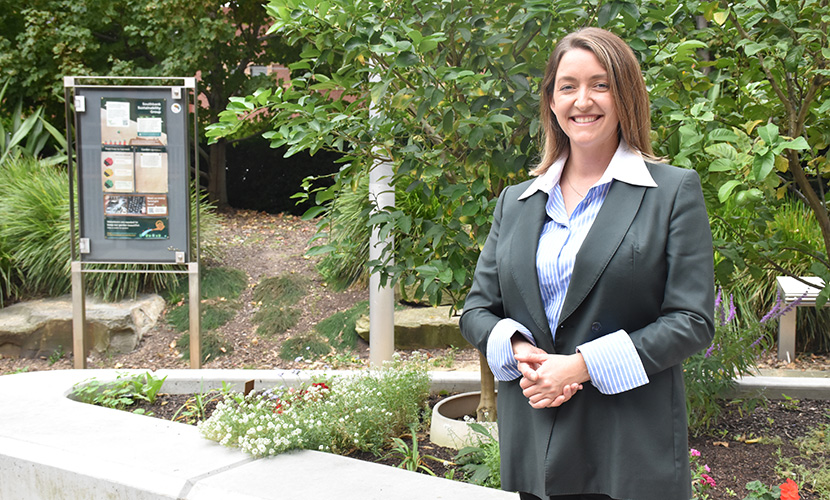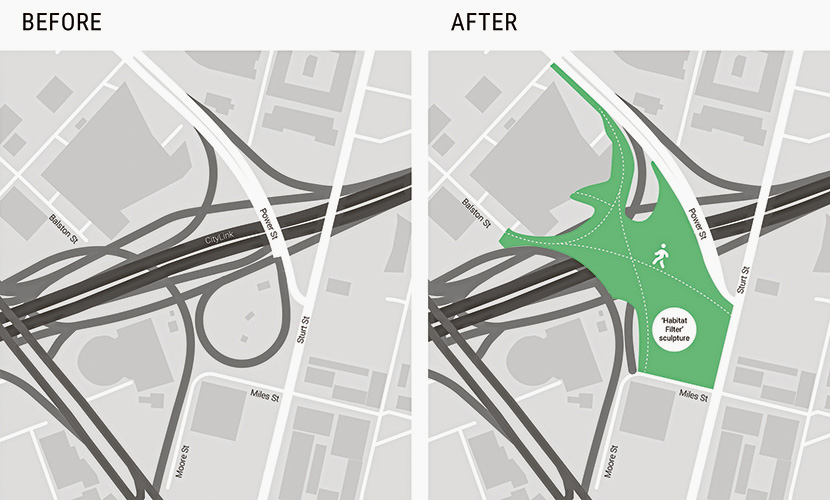Steph Hodgins May hoping to go third time lucky for the Greens in Macnamara; pledges funding for “sky park” in Southbank
The Greens candidate for Macnamara is no stranger to this electorate, having come close to claiming a second lower house seat for her party at the past two elections. Sensing a greater “resistance against both the major parties” among voters than ever before, she’s optimistic about a change of fortune come the May 21 election as she pushes hard on climate action, a federal integrity commission and, locally, Southbank’s illusive sky park over CityLink.
If current political projections are right, Australia could be headed for a hung parliament following the election. While “teal” independents have been making most of the headlines in the context of a growing disenchantment with the Coalition and the Labor Party, it’s the country’s third biggest party, The Greens, which could well prove to have the biggest bearing on the next three years in Canberra.
And Macnamara, the federal seat incorporating Australia’s most densely populated suburb of Southbank, could hold a crucial piece in the overall puzzle when locals cast their votes.
While Labor’s incumbent MP Josh Burns improved his party’s margin at the 2019 election, in 2016, former Labor veteran Michael Danby nearly lost his seat to Steph Hodgins May, who was pipped by a handful of primary votes.
At that election, the Liberal candidate at the time, Owen Guest, comfortably won the primary vote count, but it was Mr Danby who would sneak home on Greens preferences.
It’s due to this recent history that many consider Macnamara one of few “three-horse races” in the country, however, it’s Labor and The Greens who are widely regarded as the two front runners.
With nearly 19,000 residents living in Southbank as of 2022 according to Roy Morgan Research, our community will have an influential say in the final outcome; a fact not lost on Steph having spent more time connecting with locals than ever before.
“This is my third election campaign and I do know this community a lot better than what I did the first and second times,” she told Southbank News.
“We have been more successful than in previous campaigns in actually getting to people in Southbank, meeting with them where they’re at.”
“What came through really quickly was the impacts of the pandemic and how challenging that was, but emerging from that, how important community is.”
“You see the establishment of community groups, and a desire to protect what’s liveable about this community and what makes it a community – there’s Artemis [Pattichi] from the sustainability group, and MaryKay [Rauma, Southbank3006] took me on a walk around the precinct and showed me up-and-coming developments and what that would mean for the green space in the area, and talked me through dangerous intersections.”
However, she said that “time and time again”, local issues for Southbankers were coming back to climate change.
“From my point of view, it’s the most important challenge that we face but I suppose it’s reassuring and encouraging to know that from our feedback, and from our one-on-one conversations, it’s the biggest issue for people in Southbank,” she said.
While the Labor and Liberal parties have promised net zero emissions targets by 2050, The Greens’ more ambitious vision of achieving this target by 2035, while phasing out gas and coal by 2030, eclipses their adversaries.
Supported by the rise of climate-focused independents, Ms Hodgins May believes the “mixed-messaging” from the Labor Party, and people having “basically given up on the Libs when it comes to climate”, has led to increased resistance against both major parties.
“Vote Compass is really indicating that climate and the cost of living are the two most important things to people. I think people really recognise that this is a federal election, and the biggest federal issue is climate,” she said.
“They’re looking for parties outside of the major parties, which is obviously a good time for The Greens.”
Born in Ballarat to a fifth-generation farming family from Blampied near Daylesford in Victoria’s central west, Steph’s “green” values stem from a young age and have seen her pursue a career in environmental law, diplomacy and advocacy.
Residing in Elwood with husband Ogy Simic, a former City of Port Phillip councillor, and their son Otis, protecting our planet for her community and future generations is at the heart of her political ambitions.
But so too is creating a more fair and equal society. Among her party’s policy priorities for this election are building a million new homes to tackle the housing crisis, putting an end to negative gearing on more than two properties, placing dental under Medicare and making childcare free.
And when it comes to creating a more fair and equal political system, The Greens would also establish a federal independent commission for anti-corruption (ICAC) “with teeth” – another issue she said was proving to be at the top of many people’s minds.
“It’s no surprise when you see the sports rorts that have happened, and ministerial indiscretions, car parks,” she said.
We want to see an end to big donations in politics by capping donations at $1000 per person and getting rid of developer, and gas and oil donors. We can go further. You just have to follow the money and see why decisions have been made.
As for local issues in Southbank, she said she would “fight for major reform to planning, building and owners’ corporations law to distinguish between short- and long-term accommodation”, allowing for “self-determination by high-rise communities.”
She said she would also push to get more freight off trucks and onto rail to mitigate the kinds of safety issues locals experience every day on City Rd, do more to subsidise the arts and creative industries hurt by the pandemic, and provide greater funding for active transport and electric vehicles.
But for Southbank, there are few greater issues than that of open space, and she said that The Greens would commit $30 million in federal funding to kickstart a “sky park” across CityLink connecting Balston and Power streets to Miles and Sturt streets, which was first envisioned in the 2010 Southbank Structure Plan.
The project is estimated to cost $385 million. The Greens most recently pushed for the project as part of its City of Melbourne election campaign over 10 years, proposing a mixture of funding streams from the council, state government and CityLink operator Transurban.
But the latest proposal would incorporate the value of the open space reserve from the City of Melbourne ($65 million), a Commonwealth capital contribution ($30 million), and a “further $290 million that the Greens would commit to negotiating between the state and commonwealth governments.”
“COVID has brought home how important it is to our health and wellbeing to have access to green open space – for our health, for our urban environment and for social connectivity,” she said.
“Our proposal for a sky park will bring together all levels of government to deliver a transformative project which will give residents of Southbank and surrounding areas the green space they so clearly need.”
With a hung parliament looking like a very real likelihood come May 21, Ms Hodgins May said her ideal outcome was to “kick out [Prime Minister] Scott Morrison first and foremost”, “and then to work in the balance of power with the Labor Party and whichever climate progressive independents get elected.”
The Greens believe that Macnamara is its most winnable seat after Melbourne, which has been safely held by the party’s leader Adam Bandt since 2010 – the last time Australia found itself under a minority government.
While it’s a prospect some might fear, Ms Hodgins May said it was a period which saw “huge reforms when we worked with Labor for a better future” – a situation she feels optimistic about seeing again.
“I feel that there’s change in the air – I have to feel optimistic, of course, otherwise it’s a tough slog as a volunteer position,” she said.
“We’re running a bigger campaign that we ever had here so we’ll have to see what happens and hope we get across the line.”
“Southbank is going to be a really important constituency, so I encourage anyone reading this to reach out to me.” •

Sally Capp: one last chat as Lord Mayor of Melbourne








 Download the Latest Edition
Download the Latest Edition